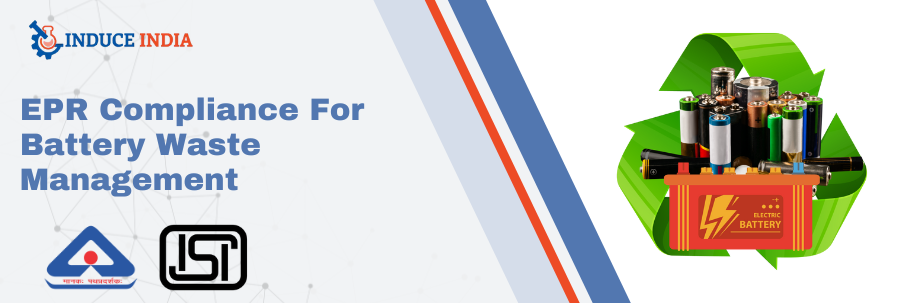As a well-established business owner or a manufacturer, you have to understand Extended Producer Responsibility(EPR) regulations for battery waste management. EPR regulations encourage the designing of products that are easier to recycle and ensure the right waste management of those products. EPR compliance includes collection, recycling, and safe disposal of batteries. It is necessary to set up collection centers and establish recycling efforts for the efficiency of EPR compliance. Let’s understand more about EPR Compliance For Battery Waste Management.
What are the Essential Components of EPR Compliance For Battery Waste Management?
EPR Registration Certification has many components and some of them are registration, collection, transportation, recycling, and reporting. Let’s understand each one of them in brief.
- Registration
It means battery manufacturers should register with the Central Pollution Control Board to obtain EPR Certification.
- Collection
Manufacturers have to collect mechanisms for used batteries. This can be done through authorized collection centers or reverse logistics arrangements.
- Transportation
After collection, transportation is also a crucial part of the EPR Registration Certificate. Safe transportation to authorized recycling facilities is essential for this process.
- Recycling
The collected batteries should be recycled appropriately and battery manufacturers are responsible for ensuring that the recyclers meet the standards.
- Maintaining records
Reporting or maintaining records is also a part of these components. They need to submit annual reports to SPCB that provide EPR Compliance details.
What are the Benefits of EPR Compliance for Battery Waste Management?
There are many benefits of EPR compliance for Battery waste which are related to the environment and businesses. Ensuring the proper collection and recycling of batteries, EPR compliance reduces the release of greenhouse gas emissions. This also helps in preserving natural resources and saving the ecosystem. It also decreases the release of hazardous substances into the environment. Not only this, recycling batteries helps recover valuable materials like lead, nickel, silver, and cobalt that can be reused in many ways. Brand reputation is also enhanced by adopting EPR compliance for battery waste management. It also builds a better identity and attracts consumers who want environmentally friendly products or want recycled items.
Proper management of battery waste through EPR compliance leads to cost savings. Recycling batteries reduces the need for raw materials and in some countries, tax benefits to companies are also provided that follow EPR regulations. It ensures the proper collection, recycling, and conserving of valuable resources.
What are Effective Ways to Manage Battery Waste?
There are many ways through which battery waste can be easily managed. By collaborating with recyclers, and authorized collection centers, you can ensure the proper collection of used batteries. You can promote or educate responsible recycling knowledge through informative campaigns with your employees, customers, and stakeholders. To create awareness about Proper battery disposal and environmental hazards associated with improper disposal you can take help of the effective campaigns.
Facilitate the return of used batteries from customers and provide take-back programs that will make it easy for consumers to dispose of their used batteries properly. Also, make accurate records of all used batteries for waste management procedures. It also includes collection, transportation, recycling, and monitoring. Conduct proper audits and identify the areas that need improvement.
Conclusion
EPR compliance includes collection, recycling, and safe disposal of batteries. It is necessary to set up collection centers and establish recycling efforts for the efficiency of EPR compliance. EPR Consultants in India help in the completion of the EPR compliance process. EPR Certification has many components and some of them are registration, collection, transportation, recycling, and reporting. Reporting or maintaining records is also a part of these components. They need to submit annual reports to SPCB that provide EPR Compliance details.
There are many advantages of EPR compliance for Battery waste that are related to the environment and businesses. Ensuring the proper collection and recycling of batteries, EPR compliance reduces the release of greenhouse gas emissions. Brand reputation is also enhanced by adopting EPR compliance for battery waste management. It also builds a better identity and attracts consumers who want environmentally friendly products or recycled items. Proper management of battery waste through EPR compliance leads to cost savings. Make sure that collected batteries should be recycled appropriately and battery manufacturers are responsible for ensuring that the recyclers meet the standards. EPR compliance for Battery waste enhances environmental protection and reduces the negative impact of used battery waste in our surroundings.



